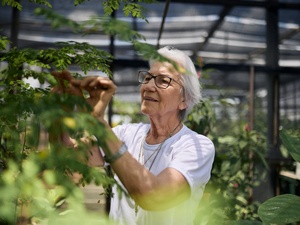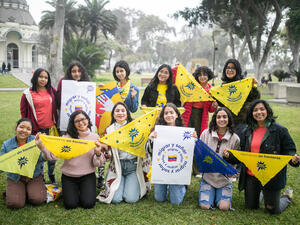Refugees from across the world hold animated discussion about violence against women
Refugees from across the world hold animated discussion about violence against women

Female genital mutilation is still the norm for many women and girls in Sudan – and elsewhere.
MADRID, Spain, December 6 (UNHCR) - "How to stop the violence towards women and girls?" This was the key issue that 70 refugees and asylum seekers were asking each other during a discussion forum organized by the UN refugee agency and the Refugee Centre of Alcobenda, in Madrid, earlier this week.
The forum was planned in the context of the 16 Days of Activism to Eliminate Gender Violence, under the theme: "For the Health of Women, For the Health of the World: No More Violence."
After an opening presentation by a UNHCR official, a Bolivian woman made the first intervention. "In my country, the woman is the protagonist of the family," she said. "She is the one responsible for everything in the house". According to her, some women's associations in Bolivia play an important role in influencing the laws to protect women and enhance their rights. However, she recognized that despite these efforts, violence against women is still widespread.
Domestic violence is common in Bolivia - as in most other countries - and it can shatter the life of families, causing both physical and emotional damage. Machismo is still strongly entrenched in the family dynamic. "When men batter women, they are not the only ones to suffer," she said. "Their sons suffer too, and they can adopt bad social behaviour as a reaction to their family environment."
To her surprise and concern, the Bolivian woman said, she now realized the same problems exist in Europe. She fled to Spain to escape her past and her family: "It was not an easy decision to abandon my country, but I was looking for security and believed new hope for my future was a priority."
Men of various nationalities - Colombians, Cameroonians and Iraqi Kurds - also joined in the discussion. Everyone recognized that to eliminate violence against women, men must also be involved in the process. In some countries it can be extremely difficult to change people's minds - especially in patriarchal cultures, where only the voice of the men counts. "In my country women are oppressed by the religion, by the state, by society, by the family and by the husband," said a 35-year-old Iraqi Kurd. "The girls, instead of being considered as an integral part of the family, are raised like some sort of special guest. The aim is to find them a husband and get them out of the house."
Early pregnancy was identified as another common negative factor in Latin American and African countries. "In my country, it is normal to see girls between 10 and 13 years old already pregnant," a male Colombian asylum seeker told the other participants.
Towards the end of an increasingly friendly and intense discussion, a small group of African women overcame their shyness, and began talking about the situation of women in their respective countries. A Sudanese woman confirmed that female genital mutilation (FGM) - a term that encompasses a number of practices, including female circumcision, burning, and the use of herbs to induce bleeding - is still being practised on large numbers of girls and women in Sudan.
Even though many governments and international organizations consider the practice a violation of human rights and a clear danger to the victim's health, the women said the practice still persists because of a variety of myths and strongly entrenched beliefs: for example that FGM is a religious requirement; or that it helps protect a girl's virginity; that it purifies her; or even that it helps save newborn babies from dying through contact with the clitoris.
There was also a discussion of the heightened risk of HIV infection through female genital mutilation, as sometimes up to 15 girls are circumcised with the same knife without it being cleaned, let alone sterilized. FGM can also cause complications during childbirth. "If the actual delivery lasts too long, the child's air passages get blocked and it can't breathe. That can cause problems, even death," said a Congolese woman, adding that she had helped during the circumcision operation on some of her sisters.
The participants also discussed how forced marriage is another form of violence that women are subjected to, which exposes them to exploitation and violence.
Not surprisingly the forum failed to come up with a strategic plan to fight violence against women and girls - that goal has also eluded many others. Nevertheless, the participants clearly appreciated a rich and animated discussion that covered the situation of women in several very disparate regions of the world. "What I realize today, is that I am not alone in this fight. Even my sisters and brothers from Africa have the same problem," concluded the Bolivian woman.
Four years ago, the UN refugee agency outlined its "Five Commitments to Refugee Women", which included developing strategies to end violence against women; individual registration of men and women; and participation in the distribution of food and other relief items. The number one commitment was to encourage the full participation of women in leadership positions in all refugee committees.
UNHCR offices around the world have been marking the 16 Days of Activism with activities and awareness-raising programmes. These are being organized in partnership with refugee communities, civil society, NGOs, governments and other UN agencies.
By Francesca Fontanini in Madrid, Spain









